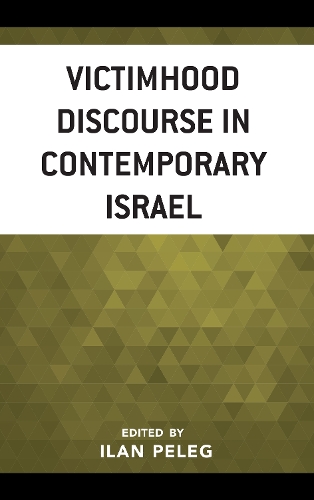
Victimhood Discourse in Contemporary Israel
(Paperback)
Available Formats
Publishing Details
Victimhood Discourse in Contemporary Israel
By (Author) Ilan Peleg
Contributions by Ruth Amir
Contributions by Yael S. Aronoff
Contributions by Moshe Berent
Contributions by Maya Kahanoff
Contributions by Irit Keynan
Contributions by Yechiel Klar
Contributions by Itamar Lurie
Contributions by Shafiq Masalha
Contributions by Daniel Navon
Bloomsbury Publishing PLC
Lexington Books
4th March 2022
United States
Classifications
Professional and Scholarly
Non Fiction
Politics and government
Travel and holiday
362.88095695
Physical Properties
Paperback
222
Width 153mm, Height 220mm, Spine 17mm
336g
Description
This book deals comprehensively with different aspects of collective victimhood in contemporary Israel, but also with the wider implications of this important concept for many other societies, including the Palestinian one. The eight highly-diverse, scholarly chapters included in this volume offer analysis of the politics of victimhood (viewing it as increasingly dominant within contemporary Israel), assess victimhood as a focal point of the Jewish historical legacy, trace the evolution and changes of Zionist thought as it relates to a sense of national victimhood, study the possibility of the political transformation of victimhood through changing perceptions and policies by top Israeli leaders, focus on important events that have contributed to the evolvement of the victimhood discourse in Israel and beyond (e.g. the 1967 Six-Day and 1973 Yom Kippur wars in the Middle East), examine the politics and ideology of victimhood within the Palestinian national movement, and offer new ways of progressing beyond national victimhood and toward a better future for people in the Middle East and beyond. The insights of the eight authors and their conceptualization of Israeli victimhood are of immediate relevance for numerous other national groups, as well as for a variety of disciplines in the humanities and the social sciences. This volume has been inspired by the universality of victimhood among humans, reflected in King Lears words (I am a man more sinned against than sinning), as well as by the words of the late Israeli prime minister Yitzhak Rabin, telling the Knesset in Jerusalem: No longer is it true that the whole world is against us. While the book sums up the state of the field in regard to collective victimhood, it invites the readers to engage in contemplating the far-reaching implications of this important concept for our lives.
Reviews
The idea of collective victimhood exists in many cultures, but the idea has made a particularly strong impression on Israeli politics. These studies take a close look at how victimhood has (or has not) impacted the history of Zionism and the rhetoric of various Israeli prime ministers both internally and externally. There are also crucial ramifications connected with the Israeli-Palestinian conflict and the treatment of refugees. Highly recommended for academic collections.
* AJL Newsletter *Victimhood Discourse in Contemporary Israel offers a rich interdisciplinary analysis of a critical obstacle to progress in settling the Israeli-Palestinian conflict. It will be valuable to students and scholars of Israel
Studies, as well as those of other societies trapped in a conflict so generously fueled by victimhood narratives.
* Israel Studies Review *This is a fascinating collection of essays, and I can see it being a very effective way to generate student interest and classroom discussion, at both the undergraduate and graduate level. Ilan Peleg notes at the outset that victimhood is a rather universal theme among human beings, and arguments offered by the contributing scholars support this assertion. After a very effective opening chapter by Peleg that sets out the analytic framework of the volume, the contributors address a wide range of topics related to victimhood, including its relationship with Zionism, the way that Israeli prime ministers have dealt with the issue, how Holocaust memory was affected by the outcome of the 1967 War, and even victimhood in the Palestinian national identity, among other very interesting chapters.
This is a well-written and well-organized book, and it will find its way into many classrooms and research projects. -- Gregory Mahler, Earlham College
No understanding of the complexities of the Israeli society, or of the seemingly intractable conflict between Israelis and Palestinians, can be complete without an analysis of the deep sense of victimhood that is so pervasive among the citizens of the state. Peleg put together a set of unusually informed and well written chapters analyzing the various dimensions of this emotion, and the result is a compelling text that is essential for the understanding of Israel and the region in general. The introductory chapter provides a valuable tool for the understanding of victimhood in conflicts among nations. -- Jonathan Mendilow, Rider University
This important and highly informative interdisciplinary collection brings together some of the foremost scholars on what has long been a central feature of the Israeli-Palestinian conflict - the politics of victimhood. Shedding new light on this complex and multifaceted phenomenon, the editors and the contributors have accomplished an exceptional feat, demonstrating how the interaction between historical, ideological, psychological, and environmental factors have engendered a highly entrenched sense of victimhood that feeds into the intractability of the conflict. The essays in this book will be a highly valuable addition to many course syllabi on the Israeli-Palestinian conflict. -- Oded Haklai, Queens University
This important book surveys the psychological and political ramifications of victimhood. While it focuses primarily on the Israeli and Palestinian conflicts, it provides a general theory of how victimhood affects the national consciousness and international images of any given population and their visions of history and memory. Its essays detail the ways in which victimhood is used politically and ultimately, how individuals may transform to get beyond such narratives. These profound insights not only apply to the Middle East, but to numerous other political narratives that dominate other areas of the world. As such, this is a valuable contribution to the general analysis of comparative politics and international studies -- Frank Louis Rusciano, Rider University
Author Bio
Ilan Peleg is Charles A. Dana Professor of government and law at Lafayette College.
